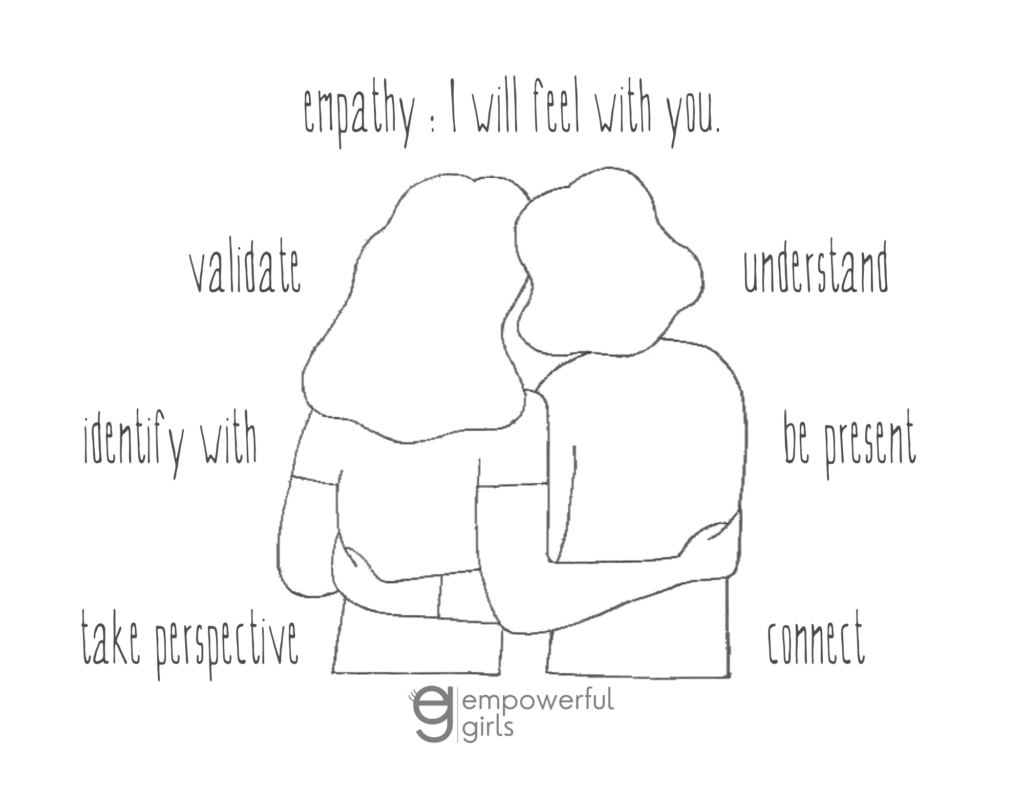
Empathy
All right, girls, I want to focus on something I feel is especially important right now, and will continue to be in your friendships, family relationships, and even interactions with people you don’t know. I want to talk about Empathy.
Perhaps Empathy isn’t something you’re familiar with. And even if you’ve heard this term before or practiced this skill already, I hope you’ll still listen to understand better.
I want you to think of a time when you felt really sad about something, and a friend or sibling or even your parent tried to cheer you up. Maybe their approach really helped you with your feelings, or maybe you didn’t feel much better afterward.
Empathy vs. Sympathy
So first, I want to help you understand the difference between Empathy and Sympathy.
The Oxford dictionary’s definition of Sympathy is “feelings of pity and sorrow for someone else’s misfortune.”
Empathy, on the other hand, is defined as “the ability to understand and share the feelings of another.”
For example, your friend’s team loses a game that was really important to her, and she’s really upset over it.
Sympathy would be like, you tell your friend you’re really sorry her team lost, and that’s too bad. You’re trying to cheer her up when she’s feeling down, which is a kind thing to do.
Empathy is more than just kindness. It would be like, even if you’ve never lost a game or never had that reaction to a loss, you recognize how your friend feels, you imagine how you would feel, you understand why she feels upset, and you listen to her and validate her feelings.
So Sympathy is feeling sorry for your friend,
while Empathy is feeling sorry with your friend.
Empathy Tools
I think we truly have good intentions when we try to help someone feel better, and Empathy is the most effective way to do that. Let’s discuss some tools to help you understand what responding with Empathy isn’t and what it is.
Brene Brown is a research professor who has studied Empathy for many years. She noted that Empathy rarely begins with, “At least …” as in, “At least you scored some points.” Empathy isn’t skipping past your friend’s feelings or offering a silver lining; it’s validating her emotions.
Empathy isn’t sharing your own experiences to one-up the other person. For example, if you said, “Well, if you think that loss was bad, something way worse happened to me …” Even though you were trying to help with her pain, that approach minimizes her feelings and shifts the focus to you. Instead, offer your experiences to identify with her, like, “I’ve lost a big game, too, so I can understand why you feel upset.”
Also, Empathy isn’t reducing someone’s feelings or telling them they shouldn’t feel that way because you don’t see it that way. Even if you and your friend had similar events happen in your life, you can’t talk her out of her feelings because she may have different meanings tied to her experience. While you may mean well, have good intentions, and offer encouragement, like, “It’s just a game; there’s always next season,” your friend will feel like her feelings are being dismissed instead of validated. Put yourself in her shoes, consider her perspective, and imagine how you would feel in her situation.
Additionally, Empathy isn’t just offering advice. When listening to someone share their emotions, hang on to your opinions until they’re asked for. Listening to your friend so you can respond or react is much different than listening to her so you can understand. By communicating that you are listening, your friend feels understood.
On that thread, Empathy isn’t trying to fix things or solve the problem or slay the dragon right away. Sometimes people need to take a moment to stare at the dragon, to talk about its features that upset them. They need time to process their emotions, so instead of trying to jump ahead, stay with them, in their feelings. Show you are present by focusing on that moment, use eye contact and non-verbal cues, and ignore distractions. Sometimes you may not know what to say, and that’s okay. Say that — that you don’t know what to say — along with “I appreciate you telling me, and I’m here to help you through it.”
I can remember many times in my life when someone responded with Empathy when I was sad, or hurt, or having a difficult time. Sometimes they shared their experiences, but it was the fact that they sat with me and listened to me that made me feel heard and understood, which helped me not feel so alone, which helped me heal.
Empathy is what connects us to someone else’s experiences and emotions.
Brene Brown shared,
“Rarely can a response make something better. What makes something better is connection.”
Let’s review the tools of Empathy:
- Validate their emotions
- Identify through your experiences
- Consider their perspective
- Listen to understand
- Be present
- Connect
Girls, you have beautiful hearts. And I know that, as you apply Empathy in your relationships with your family, friends, and even strangers, you will have deeper connections and you will help hearts heal.
Empathy Poster Printable
To help you remember all this, I created an “Empathy” poster for you to print out, personalize, and post on your wall where you’ll see it, remember it, practice it, and believe it — that’s the important part.
Resources
A few of my favorite books that illustrate Empathy are
I am Human, by Susan Verde
The Invisible Boy, by Trudy Ludwig
We’re All Wonders, by R.J. Palacio
Movies that explore this are “Inside Out,” “Wonder,” and “Beauty and the Beast.”
If you have favorite books or movies to add or have a topic suggestion, I’d love to hear from you! Send an email (tweens get the OK from your parents) to hello@EmpowerfulGirls.com .
And if you have social media already, follow me on Insta or tiktok @empowerfulgirls. I’m not encouraging or endorsing social media, but I’m on there to offer an unfiltered, uplifting alternative to what’s in your feed. Remember to get on the email list for the newsletter!
Also, if you enjoy listening to 10 for Teens + Tweens, I would truly appreciate you telling your friends about this podcast or leaving a review so others can find it and feel uplifted, too! Your support means the world to me!
